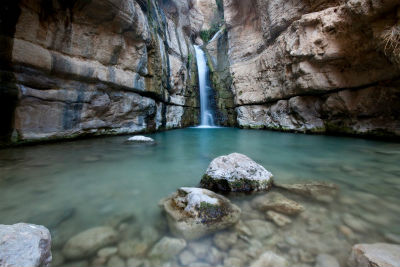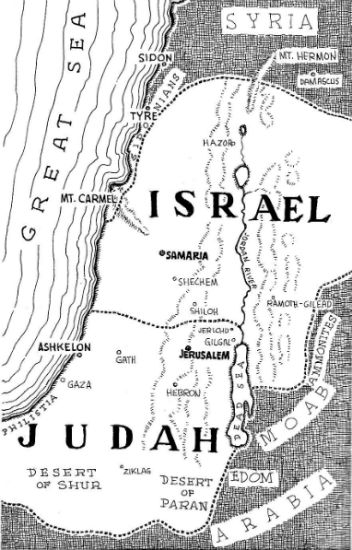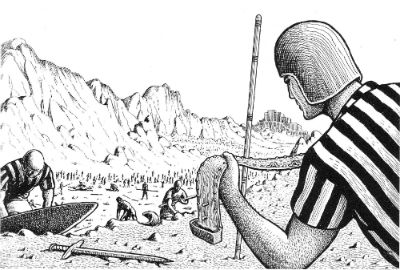 En-Gedi on the Dead Sea is still a popular resort today.
En-Gedi on the Dead Sea is still a popular resort today.By Neil Earle
The Fourth of July weekend that just passed is usually a time when our church devotes a service to special intercession and prayer for the Unites States.
We partake of a quarterly Communion service so as to be symbolically cleansed as individual Christians. This cleansing engenders assurance with the hope that our voice will be heard more readily on high. For we are then praying according to God’s plans, God’s will for our life and not our own. Christians can never be perfect in this life but we can be joined to One who is and we can reflect a perfection of attitude and spirit (1 John 3:3).
Next, after taking the bread and wine, which reminds us of Christ’s life inside us, we beseech God to listen to Jesus as he prays with us and for us, the Holy Spirit aiding every step of the way. It has always struck me as so startling that the very first thing Christians are admonished to pray for according to 1 Timothy 3 are kings, rulers, leaders and all in authority. That means, the President, the Congress, the Courts and all the state and local officials we work under.
We can’t get them all in of course but at least a national holiday is a time to be reminded of this Biblical imperative St. Paul laid out. Paul’s goal was a “quiet and peaceable life.” Paul hoped for a period of stability so we can be more effective in the Gospel work; however that opportunity comes to us in the days ahead. This was no naïve tactic on Paul’s part. One of the people in charge in his day was named Nero!

The Bible is nothing if not realistic.
This year our “text for the day” was from the Old Testament. It was 2 Chronicles 20 – the deliverance of Jerusalem in the time of righteous King Jehoshaphat.
The Bible is full of God’s people escaping the perils and hazards of normal life as well as trying to navigate a world full of hostile nations, jealous neighbors and maniacal leaders. Though Jerusalem has been besieged perhaps 118 times according to archaeologist Eric Cline, the deliverance in the days of Jehoshaphat was one for the record books (Jerusalem Besieged: From Ancient Canaan to Modern Israel).
2 Chronicles 20 makes a good study for Americans concerned about the dire events that keep coming upon them like waves of the sea – ISIS taking over central Iraq, Israelis and Palestinians escalating their disputes, strife and bitter protests on the Southern border with children fleeing chaos in their country to America for shelter, 300 U.S. advisors placed warily in Iraq but also in Poland as a symbol of resolve against Putin’s capture of the Crimea, political reminders of the Benghazi killing of four US personnel some time back – this litany of troubles shows us how volatile the world is if you are an American serving overseas and even watching the nightly news.
This is why King Jehoshaphat’s dire predicament seems so relevant.
 En-Gedi on the Dead Sea is still a popular resort today.
En-Gedi on the Dead Sea is still a popular resort today.Jehoshaphat reigned about 870-848 BC. He was one of five righteous kings who sat on the throne of ancient Judah. Sometime in his reign he was set upon by a hostile invasion from four national groupings – a Quadruple Alliance of Syria, Ammon, Moab and Edom.
This must have been a vast force. Nevertheless, they stole up on Jerusalem from the wilderness to the south and east (faulty intelligence?). They were at En-Gedi, fifteen miles southeast of Jerusalem, before Jehoshaphat learned of it. En-Gedi was a famous oasis, probably why the invading armies chose to attack through there.
Jehoshaphat was “alarmed” to say the least (v. 3). But he was a righteous king. He knew what to do in dire circumstances like his ancestor David before him. He took his problems to God. He proclaimed a fast day. People responded. “The people of Judah came to seek help from the Lord; indeed, they came from every town in Judah to seek him.”
The wise king stood up, prayed and interceded for his people in utmost seriousness:
“O Lord, God of our fathers, are you not the God who is in heaven? You rule over all the kingdoms of the nations. Power and might are in your hand, and no one can withstand you. “
He reminded Yahweh of the history of the nations, how his ancestors had built a temple in Jerusalem so he and his people could “cry out to you in our distress and you will hear us and save us” (v. 9).
This was a faith-filled prayer, even when uttered in a moment of fear and apprehension.
 En Gedi was straight east of Hebron on the Dead Sea.
En Gedi was straight east of Hebron on the Dead Sea.And God answered. He answered through a humble ordinary Levite, a priest in the temple. The Spirit of the Lord came upon Jahaziel and he passed on God’s response. That message echoed the most common command in the Bible – “Fear not!”
“Do not be afraid or discouraged because of this vast army. For the battle is not yours but God’s.”
That’s precisely what we all need to hear when problems build up. We have to remember who has the power in this universe – and it is not the kingdoms of men, whom Isaiah described as not even like a drop in a bucket.
But God doesn’t just give help – he gives strategy as well. Presidents and governors need to realize that. God is not only with them but he will give them supernatural strategy if they will but cry out for it.
So you can read the tactics the king developed in verses 18-21 as this refrain echoed in their ears – “Do not be afraid, do not be discouraged. Go out to face them tomorrow and the Lord will be with you.”
Notice the lineup – Jehoshaphat was a king and Jahaziel was a priest. We Christians are led by a King who is a Priest – the Lord Jesus Christ. We need to remember that when facing our dire problems and when praying and interceding for the USA. The Old Testament is not for our detailed obedience in this New Covenant period. But it is God’s Word. We can overhear the faith message it is always broadcasting to us if we have ears to hear.
“Do not fear. Do not be discouraged. The Lord is with you.”
Let’s hope our leaders got that message this July 4 as we and other Christians prayed so hard for them.
 Jehoshaphat's people needed three days to collect the spoils of battle – a reward for faithul obedience.
Jehoshaphat's people needed three days to collect the spoils of battle – a reward for faithul obedience.So what happened? What happened was that Jehoshaphat’s enemies began to fall out among themselves. They probably took to arguing about who would get the loot. The Lord also helped out by setting up “ambushes” it says in verse 22. So divine intervention began the counterattack and human greed and stupidity did the rest. Napoleon used to win most of his battles because his enemies were so petty and divided. General Eisenhower used to say, “Let’s remember, the enemy has problems of his own.”
Jehoshaphat and his people won out because they humbly enlisted the real power source on this earth. They were not only delivered, they spent three days dividing up the spoil (verse 25).
God always rewards individuals and nations for obedience. But more importantly God gave Jehoshaphat and his people “rest on every side.”
Wouldn’t we like to see that happen to the United States today after all we’ve been through lately? Rest on every side. Well, that’s what we prayed for last weekend. The human side of all this is to believe. That’s where Communion comes in – reminding us of the great price paid for our deliverance from sin and thus filling us with a renewed faith and confidence to face the troubles ahead.
President Abraham Lincoln made a similar petition back on April 30, 1963 when he strongly urged the American people caught in the midst of a terrible civil war – and losing – to fast and pray and go to church and turn to God. He asked that “the united voice of the nation will be heard on high and answered with blessings no less than the pardon of our national sins, and the restoration of our now divided and suffering country to its former happy condition of unity and peace” (Gaston Espinoza, Religion and the American Presidency, page 180).
That proclamation for a day of fasting was set for April 30, 1863, just as Lee’s army was preparing to invade Pennsylvania and capture Washington. Two months later – in the first week of July 1863 – two major battles were fought at Gettysburg and Vicksburg and the Union was saved. Was this God’s doing? Or just another coincidence?
Is what we did on our annual July 4 intercession another one for the record books? Time will tell. But God will do his part if we do ours.
(Drawings courtesy of The Wolverton Bible, available online.)